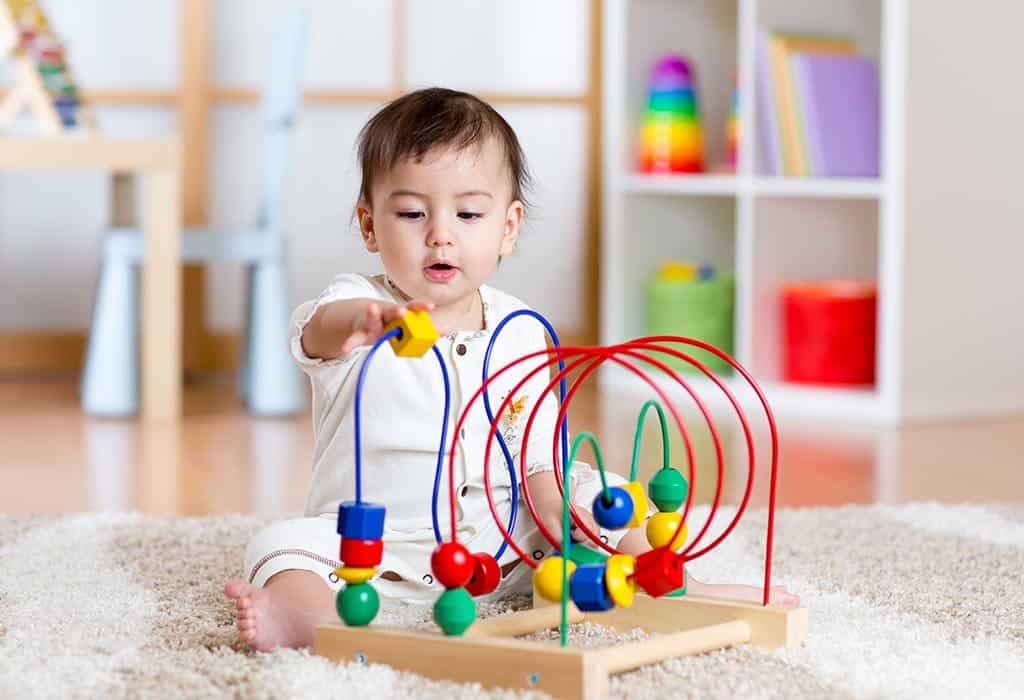
Table of Contents
33-week-old baby- Did your baby just ‘say’ mamma!? The transition from sounds to words and dealing with baby ear infections.
Your baby's thirty-third week after birth
Growth spurts and rapid development- physical as well as mental- are very common in babies at 33 weeks old, making this phase the phase of new milestones each day. At 33 weeks, you can expect your little one to throw random behavioral mood tantrums, giggling and laughing to crying and exasperated within minutes. This will be quite a harsh phase trying to understand what they need because their food habits will also become inconsistent, to say the least. While one day they will relish mashed bananas, the next day they may not be ok with anything that is non-liquid. It can be confusing but hold on there, we will try to decode week 33 for you as much as possible.
Your 33-week-old baby's development and physical growth
1. Your baby's movement and reflexes
Talking about growth spurts, you can expect your baby to crawl a lot (a LOT), only to then stand and even start walking within a couple of months here on. Their weight can also be expected to increase rapidly. Grabbing and throwing will now be a part of their personality because as their muscles strengthen, this becomes their way of testing out the new-found-strength. Changing diapers will become difficult as they will just refuse to sit still. While a baby would be active for most parts of the day, they may have some low periods or days when they would only want to cling to you and not be active at all. This is because this sudden growth and development often become taxing and overwhelming for the baby themselves. Also, make sure to use enough cushioned edge protectors around your house to keep your baby free from getting injured through all this moving around.
2. Your baby's communication
If they have not already by the previous 33 weeks old is when you can expect them to first utter ‘mamma’ and ‘papa!’ Apart from these basics, you will now hear multiple other sounds and imitation of words from your baby going forward.
3. Your baby's strength
The baby’s muscles would have developed enough by now to help them gran and hold things with their hands and fingers. They may also fight to hold the bottle in their own hands as they drink milk and while you may let them, to encourage them, be prepared for the potential mess spilled milk can create!
4. Your baby's teething progress
You can expect your baby to have more than just a novel toot by now. While their teething may be an exciting milestone, remember that they will be putting anything and everything that comes their way into the mouth now. Try and make sure you keep sharp objects and other hazardous objects out of their reach.
5. Your baby's feeding habits
Most of your baby’s meals must have transitioned to solid foods by now, making your life much easier. Most babies are able to chew soft food with the help of their fully developed gums, however, if your baby does not like chewing yet, you can puree or just spoon-mash solid food for them. Having said that even though your baby would be full-time on solids by now, it does not negate the fact that some babies may still want milk on occasions. This is absolutely OK as breastfeeding alone still can fulfill their nutritional needs. Do not force solid foods on your babies because that could create eating problems for them in the future.
6. Your baby's sleep pattern
Your growing baby will be developing their muscles at night by the time they are 33 weeks old and so, their sleep can be expected to become massively disrupted. Their daytime nap will also possibly cut down to only two naps in the day. While this change is normal and natural, it can potentially make your child cranky for a couple of weeks. Your baby may also wake up multiple times at night, crying out for your attention, and hence, co-sleeping is one of the best options at this point. If you are not sure about having your baby sleep on the bed, you could alternatively get a baby crib to keep them close to you. Also remember, if your child starts crying in at night, attend to them only if the crying continues for a few minutes.
Your baby's health
With so many milestones unlocked by your baby each day, it becomes severely important for you to take good care of their physical health.
1. Tests and Vaccinations
Your baby must have been given multiple vaccines at their 6th-month check-up and the next series will be administered at the 12th-month check-up. For some babies perceived to be at risk of contracting certain diseases, special vaccinations like a meningitis vaccine or a flu shot may be suggested by the pediatrician.
2. Ear infections
Babies between 6-12 months are vulnerable to contracting ear infections and for the sad part, as babies, they can’t quite communicate what is wrong. Keep an eye out for symptoms like excessive crankiness, loss of appetite, pulling, tugging, or grabbing of their ear, fever, yellow/white fluid drainage from the ears, and a cold/running nose as these are the most common first signs of an ear infection. In order to treat an ear infection, you will have to reach out to a professional. While some minor cases may resolve on their own, severe infections may need to be treated with the help of baby-safe antibiotics.





